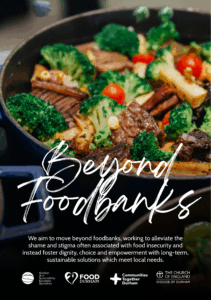Why Churches Can Help with Food Insecurity
Food insecurity has become one of the defining challenges of our time. Across the North East, families are skipping meals, children are going to school hungry, and foodbanks are stretched to breaking point. Behind the statistics are real lives: parents deciding between heating and eating, pensioners cutting back on essentials, young people struggling to afford healthy food.
In this crisis, churches have a unique part to play. Here’s why.
1. Rooted in local communities
Churches are among the most trusted and long-established institutions in their neighbourhoods. They are present in city centres, villages, estates, and suburbs alike. When food insecurity rises, churches are already embedded in the places where need is greatest.
2. Spaces of hospitality and dignity
At their best, churches are not just about handouts, but about welcome. Sharing food around a table – whether through a community meal, a café, or a pantry – offers dignity and friendship as well as nutrition. For people who feel isolated or ashamed, that welcome is as important as the food itself.
3. Mobilising volunteers and generosity
Congregations bring people together who are ready to serve. Churches can gather donations, organise rotas, and mobilise volunteers quickly. The Christian story of bread broken and shared continues when people give their time, money, and skills to ensure no neighbour goes hungry.
4. Part of a bigger picture
Churches are often already linked with schools, local authorities, charities, and networks like foodbanks. This makes them well placed to join up provision and ensure people aren’t just given emergency parcels, but also pointed towards advice on debt, housing, or benefits.
5. Prophetic voice for justice
Finally, churches don’t just feed the hungry; they can also speak out about why people are hungry in the first place. From the prophets of the Old Testament to Jesus himself, faith communities are called to challenge injustice and stand alongside the poor. Churches can advocate for change – reminding society that hunger in a wealthy nation is not inevitable.
More than food
Tackling food insecurity is not just about calories on a plate. It’s about belonging, fairness, and hope. Churches are not perfect, but they have space, people, and a calling to serve. By working together – with foodbanks, schools, councils, and community groups – churches can help turn emergency responses into sustainable solutions.
After all, every loaf shared is a reminder of a greater truth: that no one should be left to go hungry alone.

If you would like to explore `Good Food’ what it means as Christians to Feed the Hungry and how to Go Beyond a Foodbank, then follow this link for the Harvest reflections and The Food Summit.
Blog post written by Claire Estall, Community Development Worker.
